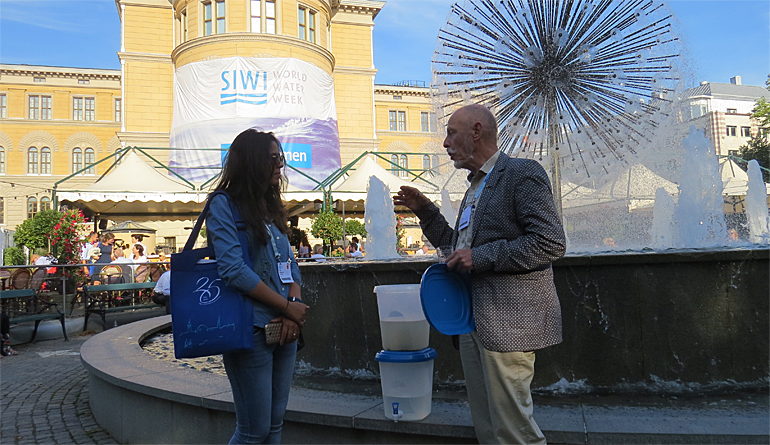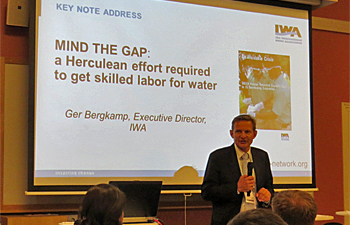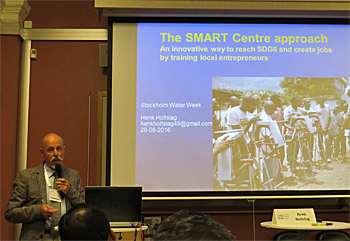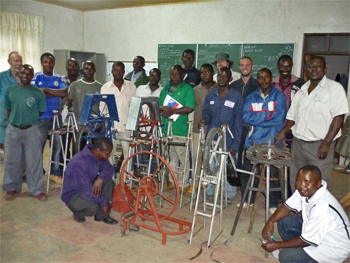Stockholm World Water Week 2016: Technical centres as water job generators in rural areas
 Five new Smart centres in rural areas in developing countries. It is a modest plan lobbied for by the Smart Group at the Stockholm World Water Week this year. Yet the benefits are multiple, as these centres can generate many new jobs and small local enterprises in the water sector.
Five new Smart centres in rural areas in developing countries. It is a modest plan lobbied for by the Smart Group at the Stockholm World Water Week this year. Yet the benefits are multiple, as these centres can generate many new jobs and small local enterprises in the water sector.
"Experiences with existing centres have learned that each centre can lead to up to 100 new enterprises and 500 new technical water jobs", said senior advisor Henk Holtslag (on top photo explaining the Tulip filter to the public) at the Smart Group at one of the sessions on the theme of this year's UN theme 'water and jobs'.
Another advantage of Smart centres is the focus on low tech affordable water technology that is reparable with local materials. According to Holtslag this is key in rural areas.
 IWA director Ger Bergkamp called to a Marshall plan to quickly educate many new water skilled professionals.
IWA director Ger Bergkamp called to a Marshall plan to quickly educate many new water skilled professionals.
Massive number of new water jobs needed
A staggering 14 million additional water jobs – mainly skilled technicians – are needed to be able to achieve the goal of universal access to water by 2030.
Director Ger Bergkamp at the International Water Association mentioned that estimated figure in his key note.
"We need a Marshall plan for more competent water professionals. Too much is being invested in just building new water facilities, and too little in skilled people that need to maintain and operate those facilities", he warned.
Bergkamp called for a strategy to get to the numbers and increase the capacity of training institutes.
 Henk Holtslag explaining the Smart centre franchise concept at the session on water and jobs.
Henk Holtslag explaining the Smart centre franchise concept at the session on water and jobs.
Low-tech affordable pumps and filters
In his reaction on these massive numbers, Henk Holtslag remains modest. For many years he has been active placing rope pumps in poor rural areas all over the world.
The repair of these pumps got him involved in setting up technical centres for all kind of low-tech affordable water devices, such as pumps, filters and rain water tanks.
As a successful example he mentions the Shipo smart centre in Tanzania that delivers skilled people to produce wells and pumps. This labor force has produced a total of 3,000 hand drilled tube wells and 10,000 rope pumps so far.
"This has lead to the creation of 35 new local companies", Holtslag adds.
 New skilled water professionals at the Shipo smart centre in Tanzania.
New skilled water professionals at the Shipo smart centre in Tanzania.
Good incubators
The existing centres have proven to be good incubators for both technicians and entrepreneurs. "They go hand-in-hand", Holtslag explains. "The technicians are trained to produce bore sets, pumps and filters. Having the technical knowledge en skills, the local community starts calling them for installation and maintenance."
"As they are trqained to work with products that are made from materials that are locally available, they do not have to wait for spare parts from the city. This is an important advantage", Holtslag mentions.
He thinks the concept of a Smart centre is an essential part of the whole supply chain of affordable water technology in poor rural areas.
Further roll out
The current challenge is to make the Smart centres financially self-sustaining, by offering all kind of services, like the local training of technicians for specific type of filters or producing manuals for local enterprises.
The Smart Group wants to roll out the concept as a franchise model so the participating centres can guarantee for quality and sustainability.
At the Stockholm World Water Week the group launched the plan to start five new centres.
Read also on this website
- Stockholm World Water Week 2016: Akvo celebrates ten-years online monitoring water aid projects, 31 August 2016
- Stockholm World Water Week 2016: Implementation of SDG6 on water gets into gear, 30 August 2016
- Stockholm World Water Week: Dutch delegation to launch programme on sustainable water use, 25 August 2016
- Connect International tests low-cost solar panel on submersible pump at Mzuzu Smart Centre, Malawi, 26 February 2015
More information
Stockholm World Water Week
www.worldwaterweek.org
Smart Centre Group
jvandriel@metameta.nl
www.smartcentregroup.com



